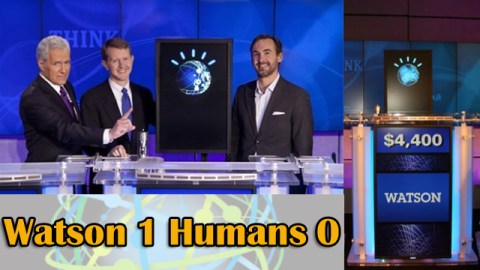IBM’s Watson Computer Beats the Superstars of Jeopardy! But What Does it Mean?

A milestone of sorts was passed this week when IBM’s Watson supercomputer bested the two human superstars of the Jeapardy! TV program, answering questions that would stump an ordinary person. Tensions were high during this contest, since the stakes are potentially very great. This contest harkens back to the famous test mentioned by the AI pioneer, Alan Turing, who said that, sooner or later, a machine will be so advanced that its answers to questions will be indistinguishable from a human’s answers.
To be fair, no machine can pass a Turing test in all situations. It is still relatively easy for a human to detect which answer came from a human and which came from a machine. But the victory of IBM’s Watson computer shows that, one by one, the machines are chipping away at the supremacy of human beings.
What this contest showed was that, in a very specialized area, machines can do better than humans. This involves answering questions that are posed in a highly stylized way, suitable for the Jeopardy! TV program. This does not involve answering questions that are posed, off-the-cuff, by an ordinary person using colloquial, conversational English.
This narrow achievement has vast commercial implications. For example, in the future we might talk to a “robo-doc” in our wall screens, which looks just like a human, but is actually a software program. We would ask this “doctor” on our wall screen medical questions (in a special format) and it would answer, say, perhaps 95% of the common questions that humans ask a doctor. Similarly, “robo-lawyer” would answer most of the basic questions concerning the law. These software programs could vastly increase the efficiency of society and reduce health-care costs.
But there are important limitations. The key limitation facing AI is mastering something we take for granted, which is common sense. We know, for example, that:
There is no line of mathematical logic or computer code that explains these statements. These are simple facts about our world that we learn the hard way, through experience. Unfortunately, there are probably hundreds of millions of lines of common sense necessary to simulate the common sense of, say, a five-year old child.
IBM’s Watson computer, although it is a marvel of computer power, is inadequate to answer questions that involve the common sense of a child.
But what about the far future, when robots finally attain the common sense ability of a human? For more on this question, please consult my new book, Physics of the Future, out in March.





